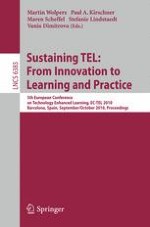These proceedings of the ?fth European Conference on Technology Enhanced Learning (EC-TEL 2010) exemplify the highly relevant and successful research being done in TEL. Because of this greatwork,this year’s conference focused on “Sustaining TEL: From Innovation to Learning and Practice.” The last decade hasseensigni?cantinvestmentintermsofe?ortandresources(i.e.,time,people, and money) in innovating education and training. The time has come to make the bold step from small-scale innovation research and development to larg- scale and sustainable implementation and evaluation. It is time to show the world (i.e., government, industry, and the general population) that our ?eld has matured to the stage that sustainable learning and learning practices – both in schools and in industry – can be achieved based upon our work. ThepresentdayTEL communitynowfaces newresearchquestionsrelatedto large-scale deployment of technology enhanced learning, supporting individual learning environments through mashups and social software, new approaches in TEL certi?cation, and so forth. Furthermore, new approaches are required for the design, implementation, and use of TEL to improve the understanding and communication of educational desires and the needs of all stakeholders, ranging from researchers, to learners, tutors, educational organizations, companies, the TEL industry, and policy makers. And the TEL community has taken up this challenge. As one can see in this volume, in its ?fth year the conference was once more able to assemble the most prominent and relevant research results in the TEL area. The conference generatedmorethan150submissionswhichdemonstratesaverylivelyinterestin the conference theme, thus signi?cantly contributing to the conference’s success.
